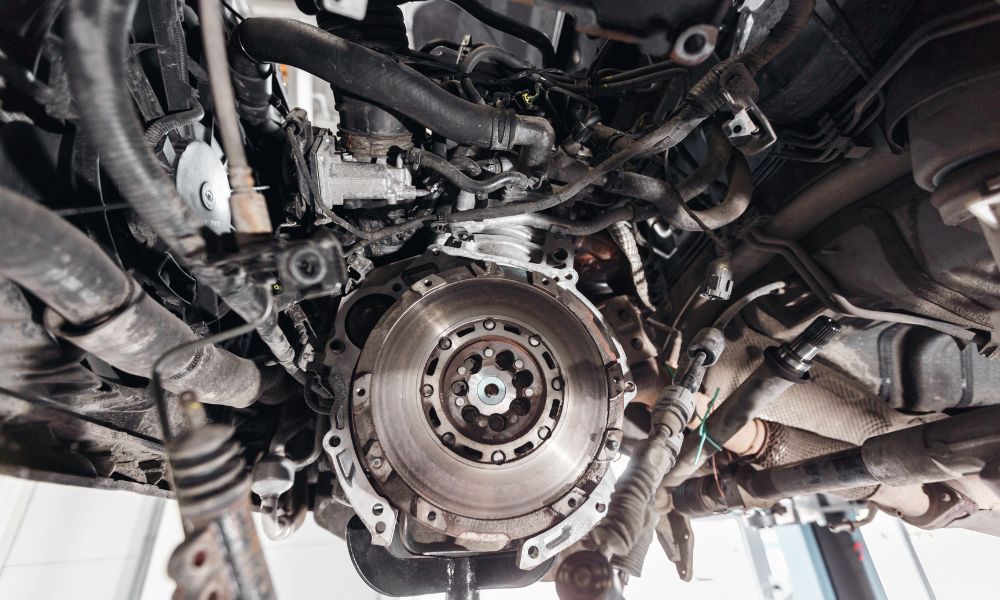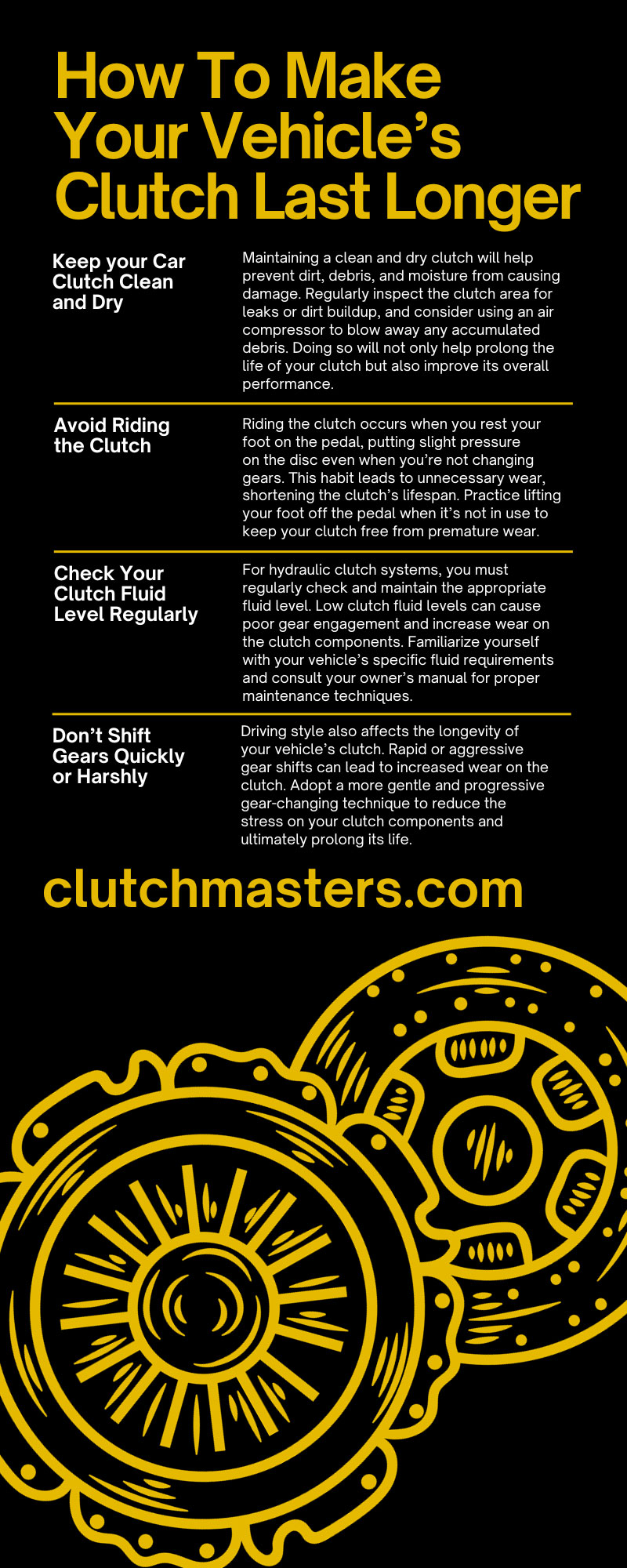How To Make Your Vehicle’s Clutch Last Longer

Like any vehicle component, the clutch can wear out after years and thousands of miles of use. But if you follow these tips, you can learn how to make your vehicle’s clutch last longer and get a greater return on your investment for your vehicle.
What Is the Clutch and How Does It Work?
Before we get into tips for extending the life of your clutch, it’s important to know what the clutch is and how it works. The clutch is an essential manual transmission component that engages and disengages the engine from the gearbox. It transfers the engine torque to the transmission, allowing you to change gears smoothly. Its primary construction comprises a pressure plate, clutch disc, and flywheel, all of which wear down over time.
Tips for Extending Your Clutch’s Lifespan
Consider the following factors that can help elongate the life of your vehicle’s clutch.
Keep your Car Clutch Clean and Dry
Maintaining a clean and dry clutch will help prevent dirt, debris, and moisture from causing damage. Regularly inspect the clutch area for leaks or dirt buildup, and consider using an air compressor to blow away any accumulated debris. Doing so will not only help prolong the life of your clutch but also improve its overall performance.
Avoid Riding the Clutch
Riding the clutch occurs when you rest your foot on the pedal, putting slight pressure on the disc even when you’re not changing gears. This habit leads to unnecessary wear, shortening the clutch’s lifespan. Practice lifting your foot off the pedal when it’s not in use to keep your clutch free from premature wear.
Check Your Clutch Fluid Level Regularly
For hydraulic clutch systems, you must regularly check and maintain the appropriate fluid level. Low clutch fluid levels can cause poor gear engagement and increase wear on the clutch components. Familiarize yourself with your vehicle’s specific fluid requirements and consult your owner’s manual for proper maintenance techniques.
Don’t Shift Gears Quickly or Harshly
Driving style also affects the longevity of your vehicle’s clutch. Rapid or aggressive gear shifts can lead to increased wear on the clutch. Adopt a more gentle and progressive gear-changing technique to reduce the stress on your clutch components and ultimately prolong its life.
Avoid Unnecessary Stops
Frequent stops and starts can take their toll on your clutch. It’s much easier on your clutch if you keep your speed as consistent as possible. To reduce wear, try planning your trips more efficiently to minimize the number of times you need to come to a complete stop and avoid stop-and-go traffic as much as possible.
Be Mindful When Driving Uphill
Uphill driving and sharp turns can put unnecessary stress on your clutch, as these moves require extra power. Be cautious during these maneuvers to ensure you’re in the correct gear and not over-stressing the components.
Drive Slower in Rainy Conditions
Wet conditions can cause moisture to enter the clutch area, leading to potential damage. Driving at slower speeds and changing gears less frequently during heavy rain will minimize this likelihood.
Use Your Handbrake When Parking
Utilizing your handbrake when parking rather than leaving your car in gear can help reduce strain on the clutch components. If you’re parked on a hill, you’ll want to leave it in gear as a precaution, but if you’re parked on a flat surface, you can preserve your clutch by using the handbrake instead. This simple act can contribute to a longer-lasting clutch.
Maintain Vehicle Weight
Excessive vehicle weight strains your clutch, potentially reducing its lifespan. Keep your car’s load within the recommended limits specified in the owner’s manual to minimize unnecessary wear. A lighter car is more fuel-efficient as well, so it’s a win-win for drivers.
Get It Inspected Regularly
The best defense against a declining clutch is to have it checked and serviced routinely. Schedule regular inspections with an experienced mechanic to identify and address any potential issues early on to preserve the longevity of your clutch.
Signs Your Clutch Needs To Be Replaced
Sometimes, a clutch simply declines to the point of replacement. If your clutch exhibits any of these signs, it must be replaced sooner rather than later.
Difficulty Changing Gears
If you notice that it’s becoming increasingly difficult to change gears smoothly, this is a sign that your clutch may need to be replaced. You might also experience grinding or slipping sensations when shifting gears, which indicates that the clutch disc has worn down and no longer provides enough friction for smooth gear changes.
Squeaking or Noisy Clutch Pedal
A squeaking or noisy clutch pedal can signify worn-out components, such as the release bearing or pivot ball. These parts may need to be replaced to eliminate the noise. A lack of lubrication on these components can also cause squeaks and should be addressed during regular maintenance. If you notice any unusual noises coming from your clutch pedal, it’s best to have it inspected by a mechanic to determine the root cause and prevent further damage.
Spongy or Loose Clutch Pedal
A spongy or loose clutch pedal can indicate air in the hydraulic system, causing a decrease in pressure and making it difficult to disengage the clutch. This can also lead to difficulty in changing gears smoothly. If you notice your clutch pedal feels soft or spongy when pressed, it’s important to have a mechanic check for any leaks and replace worn-out components. Bleeding the hydraulic system may also be necessary to improve the pedal’s firmness.
Slipping Clutch
A slipping clutch occurs when the disc is worn to the point where it no longer provides enough friction for a smooth transfer of power from the engine to the transmission. This can be caused by aggressive driving, heavy vehicle loads, or natural wear and tear over time. If you notice that your engine revs increasingly higher without a corresponding increase in speed or if you experience a loss of power while accelerating, these are signs that your clutch may be slipping and needs to be replaced.
Find the Parts You Need at Clutch Masters Industries
Properly maintaining your vehicle’s clutch is crucial for prolonging its lifespan and ensuring smooth driving. By following these tips, you can make your vehicle’s clutch last longer and avoid costly replacements.
However, if your clutch requires replacement or you want to improve your vehicle’s performance, Clutch Masters Industries offers a wide selection of aftermarket clutch kits. Our high-quality performance parts and expert industry knowledge make us the ideal choice for enhancing your vehicle’s clutch system. Browse our inventory of clutches or contact us to talk to a clutch expert today.



